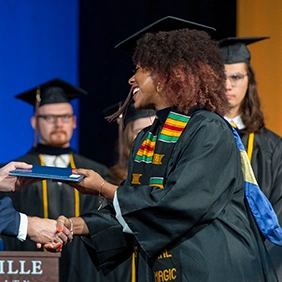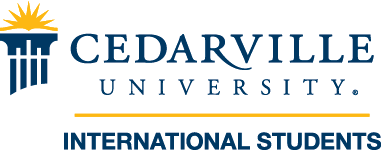Welcome to Cedarville!
We're so excited that the Lord has led you here.
From taking your first steps on campus until you walk across the graduation stage, your Cedarville family will be cheering you on and pursuing your success.
Get ready for your Cedarville experience:

Accepted Students Next Steps
First, make sure you've completed the admissions next steps, including your enrollment deposit, affidavit of financial support, and I-20 approval. Then, walk through the roadmap outlined below.
Complete These Tasks
Explore Financial Aid
If you haven't already, now is a great time to learn about the financial aid and scholarships that are available to you as an international, MK, or TCK student. You're automatically considered for an academic scholarship, but make sure to apply for need-based aid as well as any other scholarships you're interested in.
Explore Financial AidGet Ready to Arrive
Learn what to do before you arrive, then find everything you'll need to know about arriving on campus. You'll want to register for orientation and take care of your travel details by May.
Get Ready to ArriveCheck Your Student Portal
Check your admitted student portal to make sure you've taken care of required tasks like housing selection. This should also be done by May.
Check Your Student PortalGet Your F-1 Visa
Learn how to apply for your F-1 visa, enter the United States, and maintain legal status while you're studying here. You should start the application process by May.
Visa and Immigration ResourcesSubmit Medical Forms
Before arriving on campus, you'll need to purchase health insurance and upload your medical information. You should complete these tasks by June.
Health and Medical FormsPay Your Tuition
How Do I Pay?
When Do I Pay?
For more details about paying your Cedarville bill, learn more from the Cashiers Office about international payments.
Explore These Resources
Learn About Working in the United States
Learn about getting a job on campus or a practical work experience that's related to your studies. See available positions around the University, find out what steps you need to take to get started, and connect with a job that's right for you.
Working in the United StatesLearn About Driving
From driver's licenses to costs to insurance and registration, check out the helpful tips you should know about driving and owning a car in the United States.
Cars and Driving in the U.S.View Banking Resources
Learn about various types of bank accounts and cards, find out which one is best for you, and follow the steps to open a bank account so you can easily manage your money.
Banking ResourcesExplore American Culture
Navigating a new culture can be tricky at first, but we want to make your transition as easy as possible so you feel at home here. Learn about American values, classroom dynamics, communication styles, and social life, and you'll create a foundation for building lasting friendships while you're here.
Explore American CultureCongratulations!
You're so close to joining us at Cedarville and experiencing the incredible work God is doing here!
Go deeper:



















